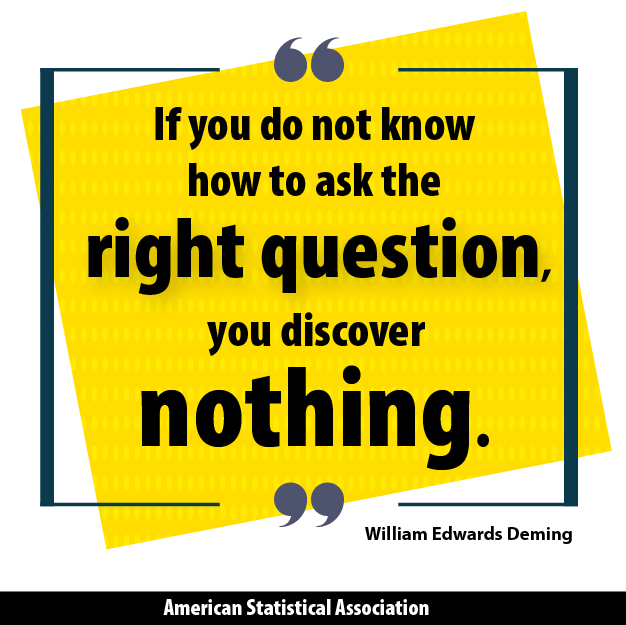7 grads weigh in on whether their double major paid off
You like statistics, but your passion is history. Should you double major? We asked several ASA members how they did it and why. We also asked if it was worth the work. Here are their responses:
Wenxiao Gu
Why did you choose to double major? How/why did you choose your combination of majors?
I was thinking to get a PhD in statistics/machine learning. I found a lot of math in those graduate programs, thus I thought getting a BS degree in both math and statistics would be beneficial.
Undergraduate Majors: Statistics and Mathematics
Undergraduate Degrees: University of Minnesota, 2012
Current Position: Business analyst of statistical modeling at Amazon Web Service
What are you doing now? Are you using both majors? If so, how?
I am a business analyst on the Amazon AWS marketing team. I use many statistical models, but rarely use complex math theories (differential equations, geometry, etc.). Math is the foundation of all quantitative sciences. I would suggest undergraduates learn applied math/stats—operational research, optimization, regression, linear algebra—instead of real analysis, for business majors.
What are some of the skills for which you are seeing the most demand—statistical or otherwise?
SQL is definitely one must-have skill for statisticians. Communication is important when your audience does not understand complex statistical theories.
Anything you’d do differently with your undergraduate program if you could go back in time?
I would get a double degree in math and computer science. Most stat courses, I mean applied ones, can be picked up easily for somebody who has a math background. Also, if you know programming, you’d definitely make a difference with a product of stats models. Nowadays, many statistician or data scientist positions require knowledge in C++, Java, or Python. Software like SPSS, SAS, and R can’t easily deal with large data sets, so statistical computing is getting more important.
On the other hand, statistics and finance/marketing/sales would be a hot combination. Since the big data era has begun, more and more business decisions are based on data and statistics, therefore is useful in many business concepts.
What advice do you have for undergraduates considering a statistics degree on whether to also pursue a second major?
Maybe some students want an advanced degree in statistics. In this case, more math is better. But please don’t ignore the growth of computer science. Database knowledge, optimization algorithms, and concepts of cloud computing will finally be part of statistical science one day, if the complexity of data gets “crazier.” In general, I love the combination of math and statistics when pursuing a BS degree.
Megan Robertson
Why did you choose to double major?
I initially chose to be a mathematics and history major because these are two fields that interested me. By studying mathematics, I found another interest in statistics, so when Amherst College added the major as an option for the 2014–2015 academic year, I knew it was something I wanted to pursue. I chose my majors because they were different areas that I wanted to study, but as I near completion of my studies, I recognize that each taught me things useful to the other majors. My background in mathematics has been very helpful in my statistics studies, as it has strengthened my quantitative and proof-writing skills. My history major has helped me improve the writing and communication skills I use to explain the results and interpretation of statistical tests, and my statistics major has caused me to think more critically about the data presented in my history classes.
Undergraduate Majors: Statistics and Mathematics and History
Undergraduate Degrees: Amherst College, 2015
What do you plan to do after you graduate?
After I graduate, I am planning to pursue a master’s degree in statistics. After finishing a graduate degree, I want to work as a data scientist or statistical consultant. I do not know what field I want to pursue a career in, but I am excited to explore the different possibilities.
What advice do you have for undergraduates considering a statistics degree on whether to also pursue a second major?
I definitely encourage undergraduate students to pursue a statistics degree if they are interested in the discipline. I have thoroughly enjoyed my studies, and I am looking forward to learning more at the graduate level. Statistics provides you with the tools necessary to understand and interpret data. If you are interested in another field, it is likely you will be able to apply your knowledge of statistics to [that field]. Data are everywhere and can be found in many disciplines: economics, biology, psychology, etc. If you find yourself passionate about two areas of study, pursue both because you will be able to use statistics to gain a deeper understanding of the other.
Vyacheslav Lyubchich
Why did you choose to double major?
When I was entering university, the strengthening businesses, new government policies, and overall economic growth of post-Soviet Russia were providing a high demand for economists. I expected my second major in economics would just help me find a better job, but it gave me much more than that. Someone said bilingual people live two lives. I would add that a second major granted me a new dimension to live in, an extra perspective for the things around me.
Undergraduate Majors: Statistics and Economics
Undergraduate Degrees: Orenburg State University of Agriculture, Russia, 2008
Current Position: Research Assistant Professor, Chesapeake Biological Laboratory, University of Maryland Center for Environmental Science
What are you doing now? Are you using both majors? If so, how?
I am teaching statistics and conducting research at the University of Maryland Center for Environmental Science. I employ economics here as well, since models from my postdoctoral projects on insurance claims dynamics and customer attrition in banks can be applied to environmental data sets.
Anything you’d do differently with your undergraduate program if you could go back in time?
I would take more computer science courses to study effective programming in different languages and take some time to diversify my knowledge through learning web design or a foreign language.
What advice do you have for undergraduates considering a statistics degree on whether to also pursue a second major?
Pursuing a second major is like acquiring an extra sense: You do not just see the statistics of a stock market, you smell that particular stocks will go up soon; you do not just see a simulated output, you taste different scenarios and hold the computer program under your control. Just ask yourself what problem you’d like to tackle with the statistical tools and adjust your perception to this multidimensional world.
Mark Kronenberg
Why did you choose to double major?
Originally, I majored in electrical engineering, but my real strength is math, not science. I entered EE because so many people recommended it because I was good in math. But math talent is a necessary but not sufficient condition to be good at engineering. I learned in hindsight not to choose a major just because someone suggested it. I changed to a math and economics double major because both fields interested me and because they are complementary fields. My decision was a good one, because it helped me distinguish myself from others. There are a ton of math majors and a ton of economics majors, but few math/economics double majors. When I chose the double major, I did so solely out of my own interests. However, in retrospect, I think having a double major might have helped me get my first job as an actuary.
Undergraduate Majors: Math and Economics
Undergraduate Degrees: Vanderbilt University, 1991
Current Position: Founder, MATH 1-2-3
What are you doing now?Are you using both majors?If so, how?
After working in the actuarial field for a short while, I founded MATH 1-2-3 (www.math123.com). We specialize in private home math tutoring. In business, it’s important to have a USP (unique selling proposition). Almost every tutoring company tries to be everything to everyone … much like a disingenuous politician. Choosing a specialty sets my company apart from the jack-of-all-trades/master-of-none companies.
Since I’ve had my company for 20 years, I’m looking for new challenges, so I’m finishing my MS in applied statistics and decision making at the Fordham Graduate School of Business. This term, I’m conducting a statistical arbitrage independent study that involves testing automated trading strategies. I will be using Excel, R, and Python.
Having a math major with a strong statistics component helped me pass early actuarial exams and also helped in my tutoring business. Having an economics degree with a strong finance component helped me in my recent MS coursework in a portfolio management course. Having a strong statistics undergraduate background is helping me with my current applied statistics coursework. Having an economics background will also help me enter the finance field.
What are some of the skills for which you are seeing the most demand—statistical or otherwise?
I have seen many job listings requesting candidates with knowledge of SAS, R, and Matlab (similar to R). Math and statistics backgrounds are frequently requested. Writing ability is important in many jobs. For example, you may be asked to explain results from a statistical experiment in layman’s terms.
Anything you’d do differently with your undergraduate program if you could go back in time?
Computer skills are very important in finance, so I wish I had started learning programming sooner. R and Python are used a lot in finance, and I’ve seen many job listings requesting those who are proficient in C++, etc. If I could go back in time, I would add computer science as a third major, even if it meant I had to graduate 1–2 years later. I would learn as many programming languages as possible.
What advice do you have for undergraduates considering a statistics degree on whether to also pursue a second major?
Choose a field that interests you and is complementary to statistics. I realize it’s easier said than done to know when you’re 18 years old what field you want to pursue, but research fields that interest you. Meet people in your prospective fields to see if they are right for you. Having a second or third major will distinguish you from others, and that’s important in the job market. I’m sure it would also help in graduate school admissions.
John Baggaley
Why did you choose to double major?
I chose to get my second major to open up more employment possibilities. Economics was a good fit with statistics as a complementary discipline.
Undergraduate Majors: Statistics and Economics
Undergraduate Degrees: Statistics 2005, Economics 2012, University of Utah
Current Position: Data Analyst, Neustar
What are you doing now? Are you using both majors? If so, how?
I am a data analyst at Neustar. I use information from both of my majors every day in my work. I was specifically added to my team because of my statistical knowledge.
What are some of the skills for which you are seeing the most demand—statistical or otherwise?
In my job (and others I applied for) we use SQL a lot. Also used are Hive, Hadoop, regular expressions, R, Tableau, and Python.
Anything you’d do differently with your undergraduate program if you could go back in time?
I would have taken more classes that focused on the computer skills needed in the workforce.
What advice do you have for undergraduates considering a statistics degree on whether to also pursue a second major?
Having a second major is crucial for entering the workforce. The second major opens extra doors and shows a more well-rounded applicant. It is a certain advantage in getting interviews and opportunities.
Sara Venkatraman
Why did you choose to double major? How/why did you choose your combination of majors?
I chose to double major because I think statistics and computer science complement each other well. I am especially interested in topics at the intersection of the two fields, such as machine learning and data mining. I enjoy learning about algorithms and programming languages that facilitate statistical analysis just as much as I enjoy learning about the use of probability models and stochastic systems in subfields of computer science such as artificial intelligence.
Undergraduate Majors: Statistics and Computer Science
Undergraduate Degrees: Cornell University, 2017
What advice do you have for undergraduates considering a statistics degree? If they were to choose statistics as a major, what advice do you have on whether to also pursue a second major?
Statistics is a wonderful subject to study because students have the chance to learn about powerful mathematical methods, but also about making practical sense of data, identifying patterns, conducting interesting studies, and communicating results well, all of which are useful skills. It is a also a great subject to pursue a second major with, because statistics is applicable to so many other fields and can make the study of another subject much more interesting. For students majoring in another subject but interested in conducting any kind of academic research or data analysis, I would highly recommend some coursework in statistics.
What do you plan to do after you graduate?
I would like to go to graduate school and hopefully earn a PhD in either statistics or computer science. I am most interested in pursuing a career in academic research, but I am open to other possibilities, including data science, medical research, finance, and engineering. For example, I will be interning as a software engineer at Microsoft this summer, which I think will be great exposure to engineering professions.
Alyssa Woodwyk
Why did you choose to double major?
I added statistics as a second major after deciding that medical school was not the route I wanted to take. I knew I was good with numbers and was thrilled when I found out how applicable statistics is to medicine. After discussing with my statistics major adviser, I was so excited to get a master’s degree in biostatistics because it allows me to combine both passions for medicine and statistics into one. At the time, I considered dropping my major in biomedical sciences, but I only needed to take two more classes to complete it.
Adding the second major in statistics meant spending five years on my bachelor’s degree, but it was definitely worth it. The knowledge I gained has helped me excel at my internship, where I spend my time providing statistical assistance to medical professionals. I also considered only getting a minor in statistics, but once I started taking more statistics courses, I knew this was what I wanted a career in. So, I decided to maximize my time at Grand Valley and complete the double major.
Undergraduate Majors: Statistics and Biomedical Sciences
Undergraduate Degrees: Grand Valley State University, 2014
Current Position: Biostatistics Intern
What are you doing now? Are you using both majors? If so, how?
I am currently finishing my master’s of science in biostatistics. I am using both majors at my internship, where I assist medical professionals with the statistical aspects of their research. My major in biomedical sciences has given me the background knowledge necessary to communicate successfully with various medical professionals. My major in statistics created the foundation necessary to succeed in my master’s program and provided statistical assistance in the research setting.
What are some of the skills for which you are seeing the most demand?
I see demand for skills in SAS, R, and SQL quite a bit. Also, working in both teams and independently has come up a lot, as well as communicating statistical results in layman’s terms.
Anything you’d do differently with your undergraduate program if you could go back in time?
Looking back, I wish I had recognized my passion for statistics sooner. I still would have gotten a double major in biomedical sciences and statistics because I do have a passion for health care and hope to get a job where I can merge both passions into one and change medicine through analytics. I never regret spending that fifth year completing my second major in statistics. I am proud of what I have accomplished and feel beyond prepared to be successful in a position as a biostatistician.
What advice do you have for undergraduates considering a statistics degree on whether to also pursue a second major?
Statistics has endless applications. A second major is beneficial and allows one to become more knowledgeable in whatever area they would like to apply their statistical expertise. There are no drawbacks to a second major. The education is worth the extra time, and I think it helps set students apart and shows a great work ethic.











This was really good insight that has helped me get a better handle on what I want to accomplish for my degree. I had been going back and forth on whether or not I should try and add a computer science major to my Mathematics degree and now I’m no longer on the fence.
Thanks for your insights, I wish you the best in your future endeavors.
~Russell